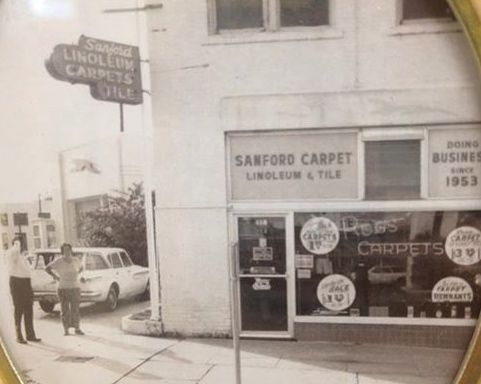
by Barb Abramson | Jan 7, 2015 |
Have you heard about the guy that wanted a red Ferrari?
Story goes, it represented a symbol of success, of working hard and finally making it in the business world. He could visualize it parked in his driveway, for all the neighbors to drool over and turn green with envy when they drove by.
The red Ferrari would mean he had achieved a status that set him apart from others. It told the world that was not a failure.
He had to have that red Ferrari.
This guy worked hard. He worked days and often worked nights. He worked weekends and holidays, all in pursuit of his goal. He was exhausted, but consumed.
His wife and children rarely saw him. Family time that included Dad was almost non-existent. He was gone before they were awake and often came home after everyone else was in bed.
He was driven. Driven to drive that damn red Ferrari.
Not only would his neighbors be envious, so would his friends. They would all see that red Ferrari in the driveway and they would finally understand why he had worked so hard. His family would know that he did it all for them.
The guy was so tired, but he knew he would never accomplish his goals and his dreams without working as hard as he did. He was stressed, but so determined to drive that sleek red machine that was his symbol of success.
The thing is, his kids didn’t care about the car. All they wanted was their dad to throw the ball with them, to attend their soccer games and school play and to just hang out like their friends’ dads did. His wife didn’t care about the car either. She also was tired of raising the kids alone, of not going out as a couple like they used to, or as a family.
But there weren’t enough hours in the week for those “leisurely” activities. He barely slept, because his mind was always racing with all he had to do. Stress was his middle name.
One day, he found himself in a most unusual situation. His afternoon client cancelled and he had no one else scheduled. His reports were filed and his boss told him to go home.
Imagine his family’s response when he showed up. He played with his kids, ate dinner with his family, laughed and relaxed and had the best night’s sleep in a long time. The next day, he awoke rested, another feeling he had forgotten about.
He was so refreshed he discovered how much work he got done the following day. With a clear head, his focus was on point and he was amazed at how much he had accomplished.
The following week, he purposely scheduled an afternoon off and enjoyed more family time and again, was incredibly focused and productive at work. By the following week, he added a day on the weekend. He discovered his productivity at work increased 25% although he was working less. His family life increased even more.
In time, the guy made an important discovery. As he learned to take time for himself and his family, his ability to balance his life enabled him to achieve more – more money, more success, more quality family time, more rest, more focus and most important – he could finally afford that red Ferrari.
And suddenly, he didn’t want it any more!
Here are 3 things this guy wants you to know about life and work balance!
Success Isn’t a Thing
You will never feel fulfilled if you gauge your success by an object – the fanciest car or the biggest house. Yes, they represent wealth, but not necessarily success.
Giving Up Family For Business is a Lose/Lose Situation
You will never get back the time you could have spent with people that you love. Or have time to develop a relationship. You lose and they lose
Without Balance in Your Life, Your Health Will Suffer
The stress will never be worth it –a never have enough syndrome creates stress that can affect not only your sleep but your quality of life.
Having things does not equate to having a life. Money will purchase objects, but it won’t purchase the feeling of being fulfilled. That comes from within and from having others to share our lives with and create memories with. You can’t recreate what you miss out on.
Photo: Flickr
Previously published on TheGoodMenProject.com

by Barb Abramson | Dec 9, 2014
My husband and I recently stopped for dinner at a local eatery that had gluten-free options. The chain is a step-down of a national chain, but not quite fast food. You order at the counter, are given a number for your table and servers bring your food to you.
The food is delivered to your table as available, so if your dining mate’s food is ready first, it is brought to the table and yours will come when it is prepared.
It’s a fairly easy system. If you are seated near the open kitchen area you can see your food being prepared and hear the banter of the staff: cooks, servers, and managers, as they prep, stage, and deliver your food.
On this particular evening, my food was brought to me and I immediately noticed it was not what I had ordered. As I looked up to let the server know, what I saw was her back as she had literally placed the food in front of me then headed off in another direction without as much as “here you go.”
Being gluten-free often means I get my food after everyone else as it has to be prepared separately and I am OK with that. But if it is not prepared correctly or is the wrong order, it adds to the wait.
But being gluten-free isn’t the point.
What’s Up?
I finally flagged down our server and she approached our table with “What’s Up?’ and an irritated attitude that reached us before she did.
I explained my order was incorrect and without a word of apology or even acknowledgement, it was snatched away and we heard some not-so-pleasant conversation as she berated the cooks because “they” had made the wrong dish. I noticed the manager was within earshot, saw him frown and turn away.
One would hope that a botched order would get high-level attention. Not the case in this case. We watched while several other customers who came in after my order was returned, got their food, then finally we heard the cook call out my food order. Again, it was gluten free so there had been an added wait.
Then it went up in the window. Our waitress walked by it three times before I politely and yes, I mean politely, asked if it was ready. I didn’t let her know I knew it was. Again, no response as she wheeled around, picked it up, and in one sweeping motion as she walked by our table, delivered the food without a word of acknowledgement, or apology for it being wrong the first time, or even eye contact.
None of the employees seemed to be having a good night. I wasn’t exactly having a blast either. Everyone in the place seemed to be irritated with each other and not once did a manager stop by to say hello, check on customers, or, since he was aware that we’d had a wrong order, offer an apology.
What I did get was a 5 Point Checklist for making sure MY customers don’t have a similar experience.
#1: You can’t afford a negative attitude.
I have no idea why our server was in a bad mood. Something could have happened at home. She might really hate her job. But what she conveyed to the customers of the restaurant was it was an inconvenience to take care of them and she didn’t really care to do so.
Had this been an isolated incident that just involved her, I might have been able to overlook it.
#2: Bickering among employees leads to negative attitudes.
Employees who interact negatively with each other in front of customers is a huge turnoff. It’s awkward and embarrassing. It shows a lack of respect for each other, the owners of the company and themselves.
#3: Lack of empathy tells the customer that they don’t matter to you.
As a customer, I want to be heard. I want my order to be heard correctly and if there is a problem, I want to be acknowledged and know that someone cares to make it right. I want to feel as though I matter.
#4: Leadership has to set the tone, and step in to correct the problem.
A manager, who does not step in to help remedy a situation and joins in with his bickering employees, shows an incredible lack of leadership. He or she fosters the negative environment and the message customers get is that their needs are less important than the issues the staff is arguing about in front of them.
#5: There is no substitute for value.
No matter how great the food is, or the cost, poor service and lack of caring for the customers will negate any benefits in a heartbeat.
Whether you are a restaurant, retail store or any other business that deals with the public, unhappy employees will kill the profitability of a business. Customers don’t need a lot of reasons to take their dollars elsewhere. Loyalty doesn’t always lead the way or have the weight it used to, especially when there are so many other companies vying for the customer’s business.
Creating Happy Customers
It’s important to recognize that, while most bad experiences aren’t this obvious, not following this 5 Point Checklist affects the customer relationship even in little ways.
So if you have a business, as my husband and I both do, I hope this checklist also helps you create happier customers, and happier team members. Especially if you are one of the team!
Previously posted on The Good Men Project and Manifast Now
Photo: Flickr

by Barb Abramson | Dec 4, 2014
I wake up most days alone. Not because I am single. I am in fact married. And not because I sleep in another room. I wake up alone because my workaholic husband has gone to work long before the sun is up.
When he gets home, he says hello to the refrigerator before he greets me. Most likely he didn’t eat breakfast or lunch.
He says has to leave early to prep for the day. On the weekends, he has to prep for the next day or the week. He writes and then rewrites the same notes over and over. Yes, he is a little OCD.
His reasoning runs along the lines that as a business owner, no one will care as much as he does. If he doesn’t make the sacrifices, and work early to late six days per week and sometimes seven, then the business might fail.
What he doesn’t get is that what is failing is his health in more ways than one.
His legs ache and he often wakes up with leg cramps. His back aches and he never quite stands up straight. His mind aches because he doesn’t have an off button. He will talk about work at any given moment he is awake. Sometimes I wonder when the business is finally gone, will we have anything to talk about.
He has a nervous cough that surfaces when he is worried about a job. I always know when he is nearby because of that darn cough. I can hide from him in the grocery store, but he can’t hide from me! He doesn’t go to the doctor unless it is an emergency. That would mean taking time off from the JOB. Eating right is not on his radar either
One night a week he does take a break. It’s his bowling night. I am excited for him because he gets to do something fun. “Good luck and good bowling” I cheer as he drags his tired body out the door.
His bowling friends are all retired. They bowl during the week. Some play tennis too. And go on cruises often. I mean very often. They send me notes on FB and emails asking me to talk to him about taking it easy at work. At least on bowling day. Thanks guys!
How do I get Mr. Workaholic to work a little less? The funny thing is he tried once. He retired his parents and tried to walk away from the business. But eight months later, he opened up again and he was off and running.
The only way he gets a break is if I book us to go somewhere. He protests. He even backs out on occasion. He calls the business everyday, several times a day to talk to the staff. He can’t unhook for long.
The worst part is when he gets back. Actually on the way back. He kicks right back into work mode and is incredibly stressed about catching up. He doesn’t sleep well that first night home and is up reviewing the job, and heading in (of course early) to get started.
My biggest fear is that when he finally does retire, he will be too physically worn down to enjoy the rest of his life. I hear stories all the time about men like him who reach that pinnacle and don’t have a lot of time left. I don’t want to put that out to the Universe – so I try not to let his stress become my stress.
The good news is he doesn’t drink or smoke. His work is physical, so he gets exercise in his own way, but many men who are workaholics with office jobs don’t.
His employees leave their jobs behind when they clock out, but for this entrepreneur who is driven to provide for his family, (put food on the table, mortgage payment, car payment, children’s college tuition, etc). it is slowly but surely wearing him down.
I’m booking a 5-day cruise for us. I know he will be stressed on the way back. But at least he won’t be able to call the business for a few days!
Previously published on Talking About Men’s Health
Photo: Flickr

by Barb Abramson | Nov 20, 2014
I used to work for a media company that was divided into several autonomous departments, each overseen by a mid-level manager who reported to the division manager. We operated pretty independently of each other and were in essence, our own little company. It was sort of like being in a franchise, except my group handled products, another group finance, a third group shipping.
That conglomerate was sold and our division formed its own company and we were a compact small business under one boss who oversaw all the worker bees who handled products, finance and shipping.
In both cases, our employee workday looked something like this:
Clock In – Work –Work -Break -Work –Lunch
Work – Work – Break – Work –Clock Out
Next day, Wash, Rinse, Repeat
The daily grind for us was just a means to an end. It was a job
Sound familiar?
The Boring Routine
Week in and week out employees trudge to their cubicles, sit at their desks and accomplish tasks assigned to them. Using the same scenario but a different job, employees will also show up at their retail shop, or the service-oriented installation company or business office for their filing clerk duties. You get the picture.
While the job title may change, what all these employees have in common is they are unmotivated. The relationship with their co-workers resembles surface camaraderie. However, they all share the same trait – they watch the clock on its slow journey to the end of the workday and their release from job hell.
For managers and other corporate higher-up-the chain bosses, who view their workforce as unengaged -“doing just what it takes to get by employees” – you are getting back what you are fostering in your staff –- the bare minimum.
We talk about teamwork, but do we really have a team?
What is a Team?
A team is a group of people that come together to achieve a common goal.
When you look out at your pool of employees, do you see a team? A group of people by definition is not a team. There must be a purpose – a reason for them to come together and it is more than just working in the same building.
A team is created. A team is inspired. A team is invested in. A team is led.
As a leader, understanding who is on your team is essential to its success. What are the strengths and weaknesses of each team member? Delegating tasks based on those skills creates an environment of interaction and flow.
Investing in your team on a more personal level also strengthens the team. This doesn’t mean you have to become best friends with your staff. But showing that you care about who they are as much as what they do for you creates a relationship that fosters trust.
People need to feel connected to other people at work, including both coworkers and their boss. Not feeling connected is actually a prime reason for job dissatisfaction.
Team members who can relate to each other on a variety of levels enjoy interacting and working together to solve problems and create opportunities.
Engaging a Team
How do you foster a team environment in the workplace, especially if there has not been one in place before?
Create a roundtable environment and ask your team to share what matters to them in the workplace and outside of work as well. But don’t just play observer. Join in with your visions as well. Engaging and interacting with each other can foster a creative process for business development and problem solving. You many want to have session like this on a routine basis to further the inter-workings of the team. If someone new joins the team, be sure to give him or her the opportunity to get up to speed and acclimated into what is already comfortable for everyone else.
Just like a woven fabric is stronger than individual threads, a well-designed team becomes a support system for the company and each other.
Originally appeared on blog.manifast.com
Flickr Photo Credit:
Sean MacEntee

by Barb Abramson | Nov 16, 2014
I majored in communications in college and worked for 12 years in the media industry until my job was relocated to a different state. And while I was offered the opportunity to move across the country, several factors held me back and they all had to do with family.
My parents and my husband’s parents both lived within 15 minutes of us. Our son had the benefit of growing up with both sets of grandparents nearby. My husband and I had very special relationships with our own grandparents and wanted that for our son. Family closeness both in relationship and proximity was important to us.
Then there was the family business. My husband ‘s parents opened a flooring company in 1953. His father was one of five children who all had at one time, a flooring business. I think it was in their blood. My husband helped his dad during the summers while he was in high school and eventually worked there full time. He had gone to college to be a P.E. teacher, but when his father fell ill, he put his family first.
When we were engaged, his dad sat me down to ask me what my intentions were for the business. After all he stressed, all the spouses of his siblings worked in their stores. “Oh no!” I countered. “I have my own job, my own career.” Not for me. Besides I didn’t know anything about running a business. And I happily went about my career.
When my company relocated, I toyed with consulting for a couple of years. At the same time, my husband wanted to retire his parents and asked for my help. I had showed up at the store now and then over the years and knew a little about flooring. I couldn’t help it. My husband lived and breathed it and he and his parents talked about every job, every day. He would spend the day with them, come home and they would talk on the phone about the next jobs on the schedule.
So when he asked me to help him, I first refused. Then I relented and agreed to one year, which turned into two and then five and suddenly it was nearly 20. I have to admit, I am proud of what I have accomplished with our business as I learned to be an entrepreneur and run a successful “Mom & Pop” shop.
Working with your family can be extremely rewarding. There is a deep sense of accomplishment that you can share with the ones you love. They get you. You get them. There will never be a lack of conversation at the dinner table. You are part of a legacy and never have to worry about the nepotism rule. In fact, you can groom you children right into the family business.
On the flip side, working with your family can be extremely stressful. It can be so much a part of your life that relationships between parents, spouses, children and siblings can suffer. There are days I want to run from the room screaming!
It is really important to find a balance so that the business and the family both win.
Here are the 5 Ways Not To Lose Your Family to the Family Business
Leave It At The Office
Employees are often told to leave their personal lives at home. Family-run business owners should leave their business life at the office. Your friends and other family members who don’t work there may not want to hear “shop talk” every time they are around you. You may also be more obsessed than other family members. Waking up and discussing business first thing can be a turnoff!
Defined Roles At The Office May Not Apply At Home
Are you the President, CEO, Chairman of the Board, Big Dog on Campus? You may be at the top of the food chain at the office, but that doesn’t mean you rule the roost everywhere else. Work and home are both communities that require cooperation and team thinking.
Don’t Pressure The Kids To Go Into The Family Business
Working with family may be your dream, but it may not be your kid’s. They have their own dreams and aspirations and they may not be the same as yours. Understand that the next generation may not be carrying on your legacy.
Have Outside Interests Outside Of Each Other
Can’t get enough of your family and/or spouse/partner. You should. Get involved in events and activities that DON’T include each other. Discover other people and experiences. It will give you more to talk about with each other too!
Don’t Forget To Have A Life
All work and no play is never healthy for anyone. No one will care about your business like you or your family does, but if you don’t have a healthy balance, you will miss out on the great things going on in the world around you.
Originally appeared on GoodMenProject.com





